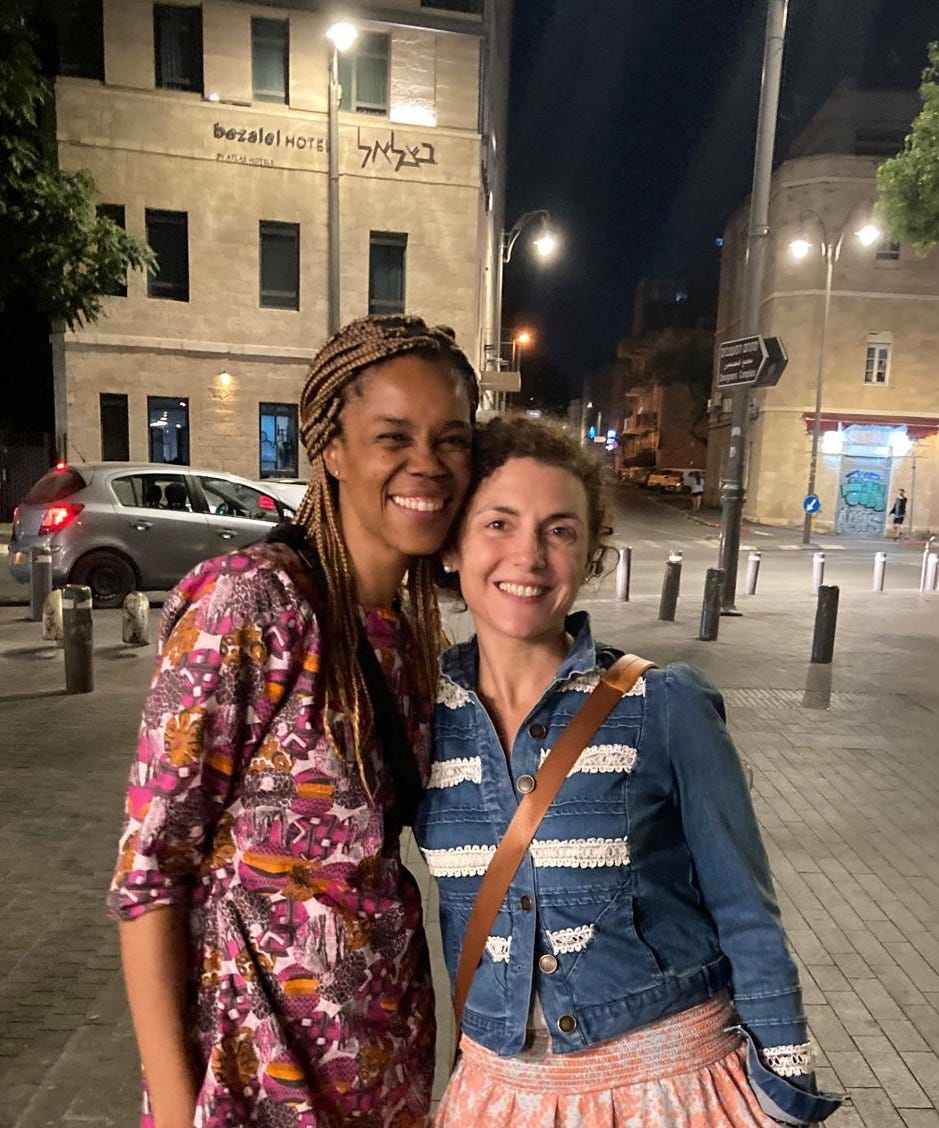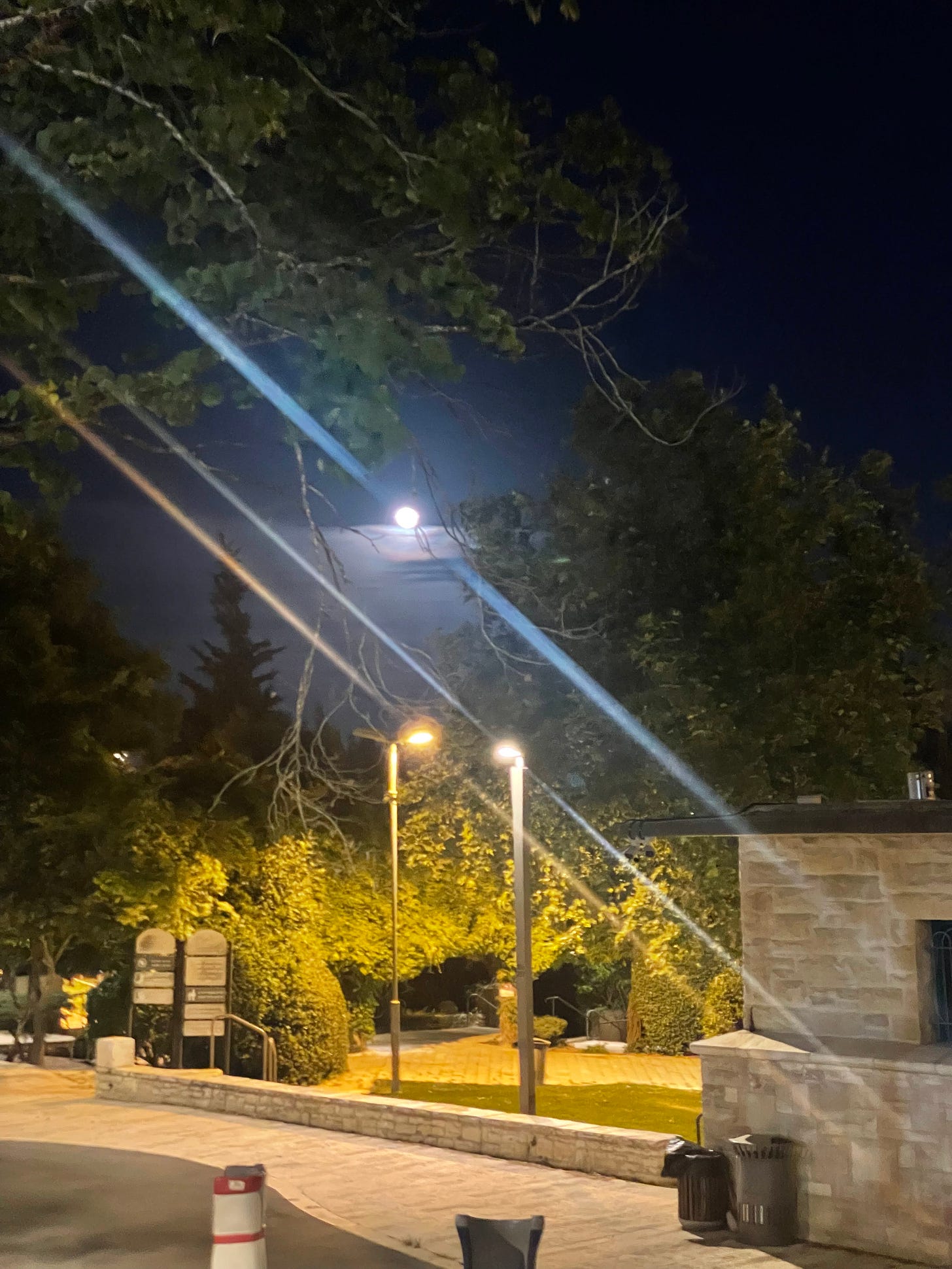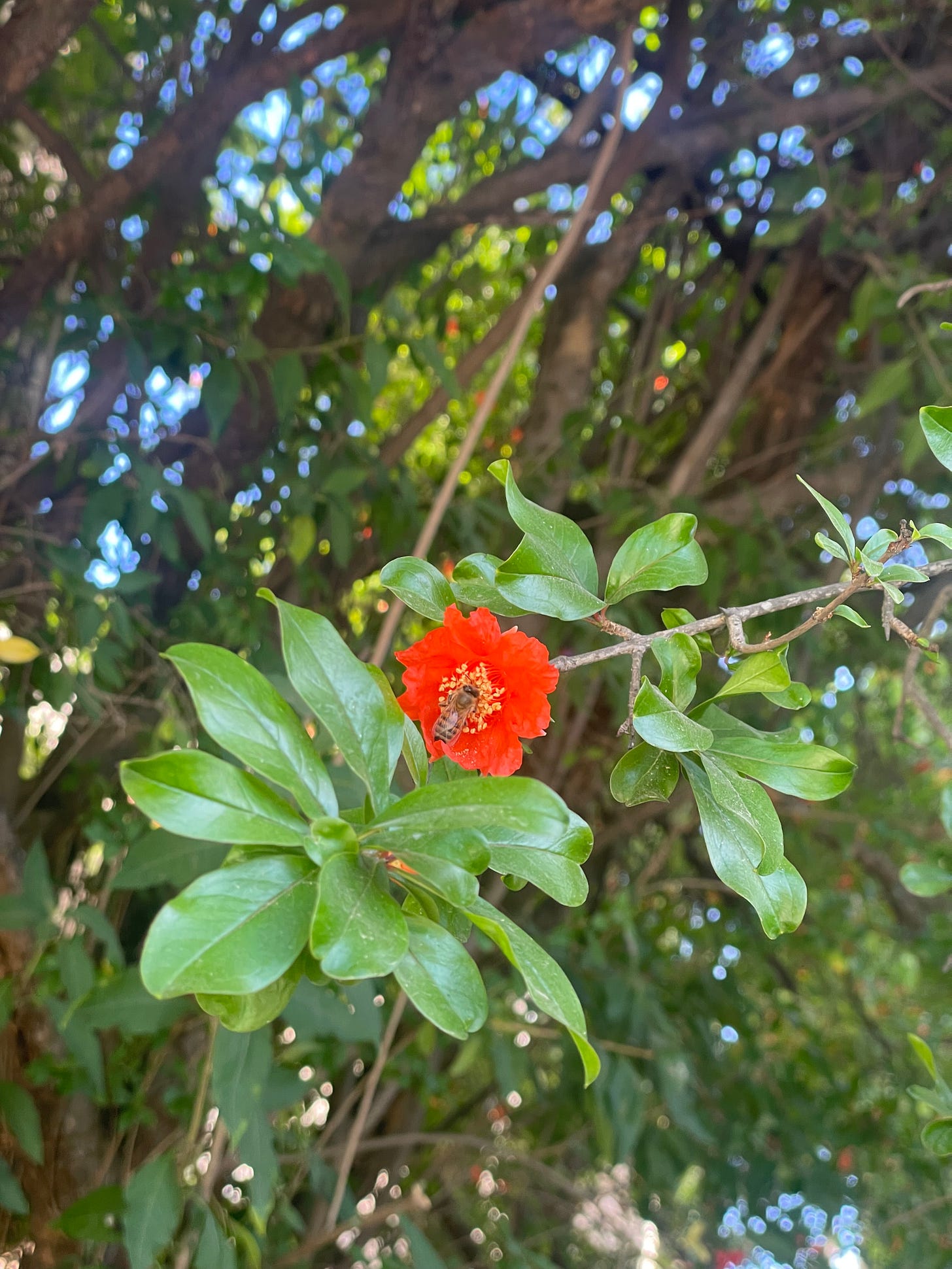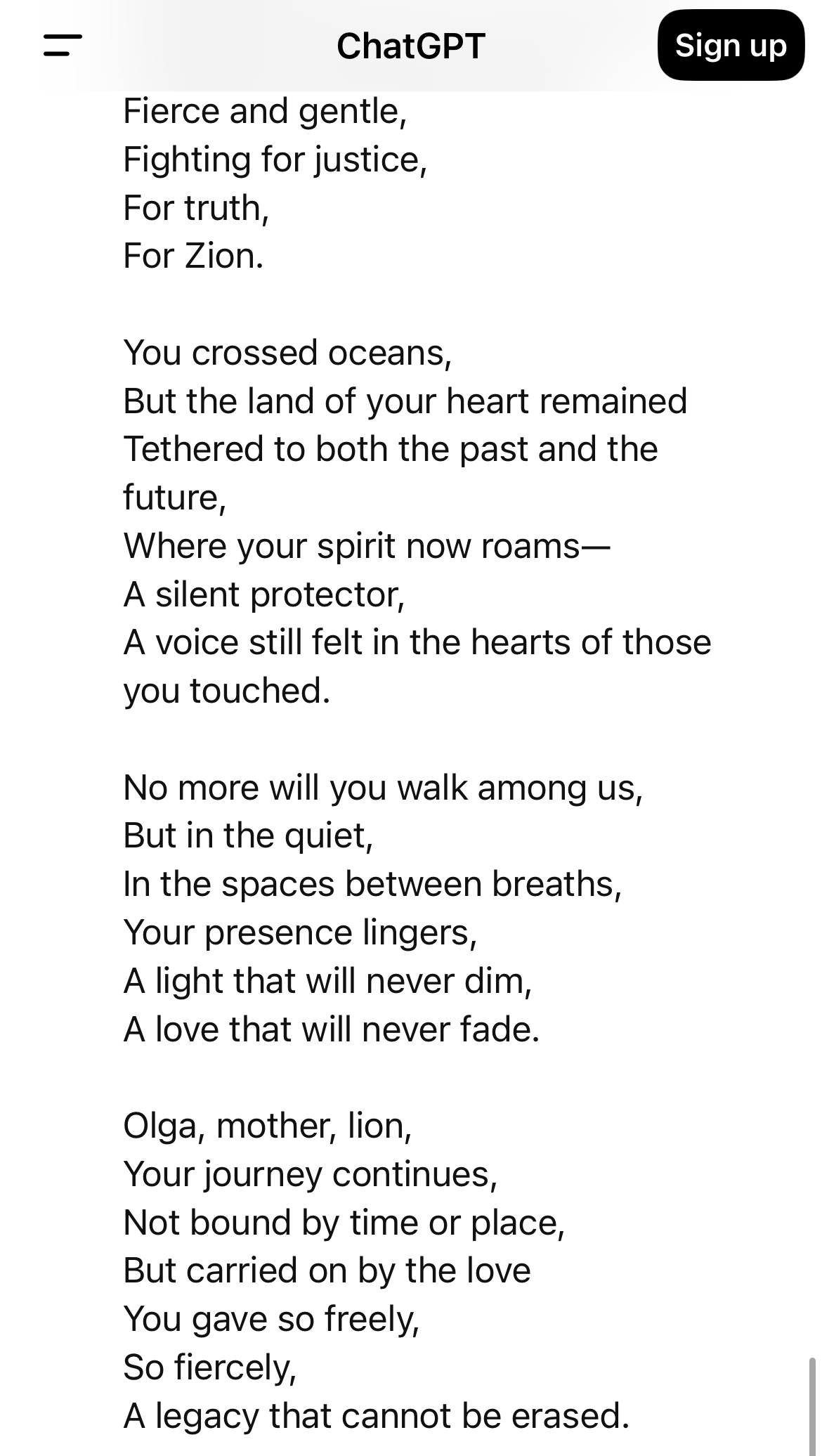The Battle for the Soul in the Age of AI
Includes a HUMAN vs AI Test with an Elegy Poem for Olga Meshoe Washington (at the bottom)
Sometimes I feel we are living in a time that is a battle for the soul.

On Friday night I was at a Shabbat meal with a musician. He said he had begun to use Chat GPT to generate songs. How does that feel? To have AI generate songs? If a song comes from Chat GPT, even it is a wonderful song, what does that do to the musician’s soul?
My children tell me I live in the last century (I was born in that century true). They tell me I don’t know anything. Are they saying Chat GPT knows everything?
What world are we creating where we can know everything on a device the size of our palm?
The older I grow the more I realize how much I do not know.
The older I grow the more I realize that all the knowledge in the world does not make us wise. As renowned Turkish writer, Elif Shafak expounds in an interview — here.
But I do know what it means to write a poem. I know what it is to feel the rush of emotions and try make sense of feelings in words, on a page. Often they are a real mess of words. My inner chaos tumbling out like a large load of wet laundry. I need to dry each item. I need to fold each one and place them where they belong. It is a process.
What has happened to wringing our hands and hearts with struggle and process?
Of course if Chat GPT could wash and dry my laundry, fold it and place it correctly in each child’s room (no small feat with four boys) I would be ever grateful. I know AI is saving lives in the medical field with accurate diagnoses that doctor’s can’t easily calculate. (I have a friend who has been leading in this space for years.)
When it comes to the creative world however — to our writing and reading world I wonder how AI and Chat GPT can replace our human struggle. Our human seeing and understanding and wondering.
Like for example last week it was a gorgeous morning in Jerusalem. Tendrils of white star jasmine flowers flowed over fences, purple jacaranda blooms graced the sidewalks and roads, the coffee shop was bubbling with the early sounds of coffee grinding, people chatting, babies gurgling. It was around 7:20 am, maybe 7:40. I don’t remember the day or exact time anymore.
I ask Chat GPT to tell me what time were the sirens last week. It does not tell me the right date or time. Its siren recall is from March, April. May does not exist. But it happened, so I check my cellphone. I had messaged a house guest we had and find it was at exactly 7:42am when I wrote, “Hi, there may be sirens. Just heads up in case.”
(Yes there was a pre-warning from Home Front Command.)
At that moment, 7:42 am, there was silence. Not even a bird call, as we waited for the rockets to fall.
We tumbled inside the coffee shop. There is no security room in the coffee shop, and to be honest we’re more than a little exhausted by too many sirens of late in Jerusalem (all over Israel). And then the siren blares. It is a long siren. And as it wails we watch in amazement a group of children, a gaggle of 7-9 year old boys and girls, strolling and smiling down the hill to school in the middle of the siren. As if there was no siren.
What world are we living in where children are used to sirens?
We wait for the booms of the Iron Dome intercepting (it is always a miracle), and we bring our coffees back outside, and breathe in the air, and wonder at the chaos of the day, as Israel has just shut down for all of ten minutes. How many frantic parents were there as the country’s children were either at school or on their way to school. My friend shows me a potential client’s face she photographed the other night on a Zoom meeting when she told her she has to get off the call because of a Houthi rocket siren. The look of abject horror on this English woman’s face is what we should all feel and speak about, but we can’t, because we don’t want to scare the children.
The cars commence their rush hour journeys. And we forget there was a rocket, because what else are we meant to do?
Now Chat GPT couldn’t tell me what time the siren was last week. It could not describe the children walking to school in the midst of it. Chat GPT is a tool, a gatherer of information (a dodgy one), an editor (again dodgy), and perhaps sometimes even a therapist. I confess I asked parenting advice for my tween, and I swear it was very sound advice. I even complained about my husband inconveniently throwing out my date jars’ rubber seals and it was surprisingly empathetic, humorous and offered advice, like labeling my kitchen a ‘husband free zone’, it also added a relationship plan. (I am not joking. Maybe a not dodgy therapist…but still I would rather sit with a real human being and muddle through my problems with their practiced life advice.)
Perhaps that is why I’m writing about Chat GPT, because it is brilliant in so many ways, and that makes it so dangerous. It can steal your voice!
I don’t want to live in a world where we don’t believe in our voices, in our opinions, in our words anymore, because Chat GPT can do it better, neater, easier.
We are human. We are flawed. We are born to struggle. Without our struggles with words, with our environments, with our sentences and each other how do we grow? How do we create anything of value? And here is the ultimate question — how do we really truly connect to ourselves and others?
I am wondering at the missed opportunities to connect, like when I ask Chat GPT about which flowers grow best in the summer in Jerusalem ( moss rose, zinnia, lavender and yellow marigold), instead of asking a gardening friend, or making a new friend at the nursery.
I am wondering at all the students that write their essays with Chat GPT, and don’t know how to formulate a sentence by themselves. Worse they don’t get to experience the heady journey of discovery when you follow a germ of an idea and explore what it grows into. What does that do to our students’ confidence and articulation?
If we don’t hit walls how are we going to discover other avenues of thinking?
What happens when we know everything, with Chat GPT as our mouth piece?
To think you know (or have to know) everything is disempowering, and the less powerful people feel in their voice and creativity the more vulnerable they are to manipulation, to emptiness, to seeking to fill it with simplistic slogans and dangerous propaganda. What happens when you feel everyone, including a robot knows better/can do it better than you can? Nuance and self agency, self confidence, self realization is paralyzed.
A month or so ago I had a wonderful writer attend a literary salon in my home who shared a poem she wrote with Chat GPT. We told her that her voice is much more alive than Chat GPT. But she genuinely felt that Chat GPT was more qualified to write poetry than she was. It wasn’t, even if it achieves perfect rhyme. It stole her moment to share her heart; flawed, and unrhymed, and feeling — human.
What scares me is what if we forget how to be alive? The magic of risk when we express ourselves. (Like with this essay. I can’t tell you how I’ve been procrastinating writing this.)

This is why I believe in mistakes now more than ever. (Although I apologize profusely for every single one of my grammatical and spelling errors in my posts. It’s a genetic brain glitch I swear (no matter how many times I reread my work). And yes, I refuse to use Chat GPT — to my husband’s chagrin.) I believe in human sorrow and human joy, that does not rhyme perfectly. I believe in seeing and expressing what we see. Chat GPT and AI can’t see the children nonchalantly ambling down the Jerusalem street in the middle of a siren. It cannot sense the mixed emotions of this scene.
Why am I writing this? I know we are living with AI now, and many have written about it. I think AI can be a blessing (especially in the medical world), but I am making an appeal here, to anyone tempted to give up their voice for robot perfection — Don’t do it. Write your songs from your soul. Struggle with the rhythm of your heart. Follow the beat of your wrist pulse. It is alive. It is singularly you. Don’t let anyone, any thing, any self-doubt take it away from you.
It is better to be alive and struggle with sentences and expression and mistakes, than give it over to a robot. To lose faith in yourself.
Rejoice in being human. Our flawed sentences may very well be our salvation. Proof that we are real in an increasingly unreal world.
Sarah
The AI vs Human TEST — I thought I’d share a eulogy poem I wrote for my dear, soul friend Olga Meshoe Washington who tragically passed away in January. Her husband and two beautiful boys, Ezra and Judah are here visiting at the moment so she is feeling ever present at the moment in my life. It is a raw poem. I remember sharing it with my husband on the drive to her funeral in a cemetery near Haifa on the 25th of January. I said to him, “Chat GPT could not write this poem, not in a million years.”
We decided to do an experiment I put the key words for Olga in Chat GPT and I will let you be the judge which poem is better — human vs artificial intelligence (rhyming and non-rhyming options).
I know Olga would have been chuffed by this experiment. She was so human, so full of humor and joy. Being human is daring to write what we think and feel and asking these questions.
Let me know what you think?
Olga Meshoe-Washington 1981-2025 I feel you next to me. A warmth seeping through the windows with fire pit ash. Your hair is in long blonde braid extensions like when you visited with your boys. The last time you were in Israel there was a war and I missed you. The war is still going on. But you are not. How do we fight this war without you next to us? Your last Instagram post was “Be Still and Know that I am God” (Psalm 46:10) There is no choice in death, is there? There is only God’s will that you served all your life. I want to sound intelligent, elegant worthy of your light as I type this. Girl just write, you say in my ear. The truth is it should have been me instead of you. I wanted so much for you. Not just your activism and your service to Israel and us Jews - us Fucking Jews (why do we need people to fight for us? We needed you.) Don’t tell me off for swearing. I know you always said we are God’s children. Together we were children. Girls. You made this world real. This morning I ran with Micol. You remember her. (Nanny V stayed with her when you visited last with your boys.) We stood on Bible Hill watching the sun rise a gorgeous bright belly button. Last week rains swept through the burial cave ruins sliding and draining into Emek Refaim, the Valley of Ghosts. You and I once had coffee there. Swallows circle with remembering. A biblical scholar says that this could be the site of Golgotha where Jesus was crucified. But what I was searching for were the autumn crocuses breaking through soft pink. The earth has its mysteries. We don’t know much about the earth’s wisdom, like we don’t know about our own bodies wisdom. What it tells us. What was your body telling you? You wanted to be everything. You produced flowers from your skin. Anemones, saffron crocuses, wild tulips, daffodils. You were full of color, and wonder, and questions. You are in the earth now with all its mysteries. If the earth is the body. Then perhaps (for sure, you say in my ear) people are the soul of this earth. We give it life. When all people disappear there will be no one to wonder at the beauty of a crocus flower breaking through the earth. No one to hold it close - the soft pink comfort. You saw so much more. I don’t know how to count all the stars. I don’t know how to count all the grains of sand. Apparently a person’s heart beats 2 billion times in this life. You only had a billion. But your heart still beats in your boys. Now what will your boys do without you? I promise you I will always be there for them. I promise an open heart and home. I promise I will be braver. It’s a calling this life. It’s a calling you answered day in day out whether anyone listened or not. I don’t know how long you’ll sit with me in the shower and cry mother to mother what it is not to be there to hug your sons. I don’t know how long you will hover over my shoulder and in your sing song voice say girl it’s going to be okay. I’m still here in the New Jerusalem. I love you Olga Meshoe-Washington a deep soul love of comfort of not being alone in this world. I will live my next billion heart beats with your pulse next to mine. Sarah Sassoon, January 2025
Read my free online, award winning poetry collection, published by Harbor Review - This is Why We Don’t Look Back.
Note - My Substack will be fortnightly. Maybe more often… I appreciate all comments, all conversations, and all sharing.
Further - All mistakes are proof that I am human, and this is not an AI publication.
Sarah’s Substack - Picking Lemons is a reader-supported publication. To receive new posts and support my work, consider becoming a free or paid subscriber.









Sarah, it’s your poems for sure. The AI generated ones are vague, anonymous. Like they were written by a journalist instead of a friend. A journalist writing in a ninth grade notebook. Yours has an intimacy no machine can replace, not the aggregate of 100,000 other poems simplifying and averaging to the mean.